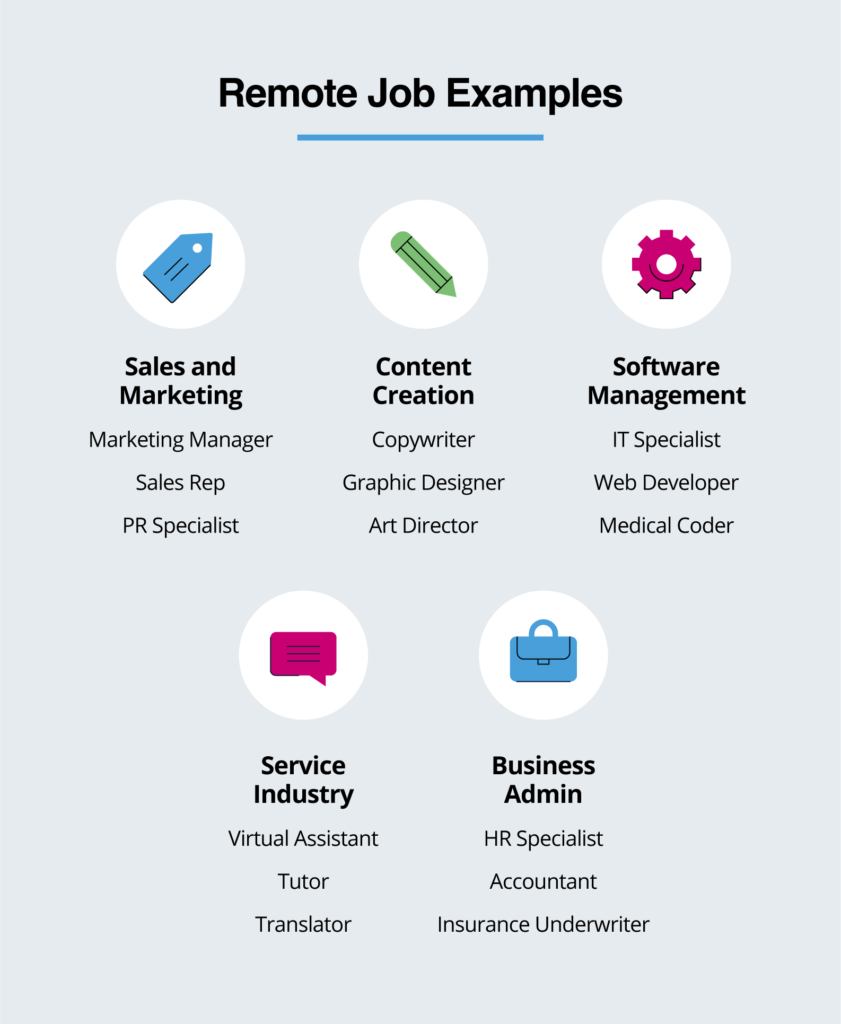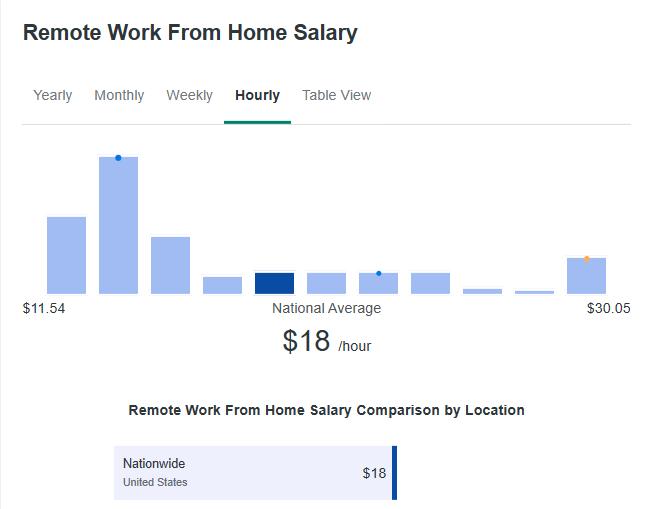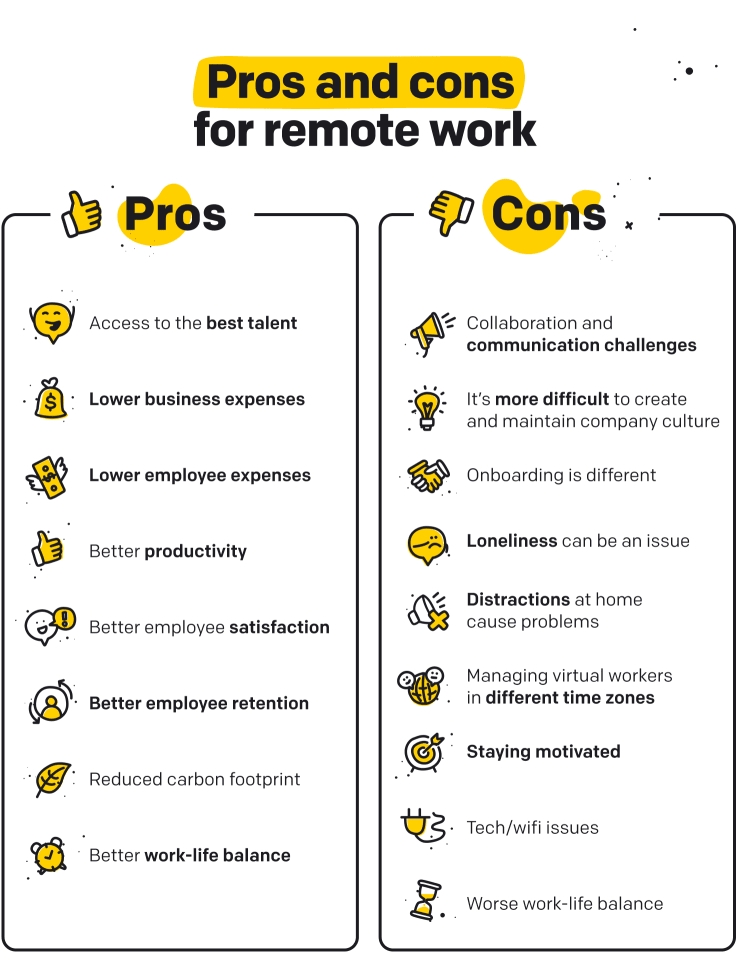Remote workhas become a prevailing trend in today's professional landscape, offering employees the flexibility to work from various locations outside the traditional office setting.
The advancements in technology and changing work dynamics have propelled the adoption of remote work across industries. As remote work continues to shape the way we work, it is crucial to understand its impact, challenges, and potential for the future.
Which Industries Still Offer Remote Work?
Remote work has become increasingly prevalent across various industries. While the feasibility and extent of remote work may vary depending on the nature of the job, the following industries have shown a significant adoption of remote work:
- Technology- The technology industry has been at the forefront of embracing remote work. Techcompanies often have the infrastructure and tools necessary to facilitate remote collaboration and communication.
- Customer Service- Many customer service roles can be performed remotely, with employees handling customer inquiries and support through phone, email, or chat platforms.
- Education and E-Learning - Remote work has become more prominent in the education sector, with the rise of online learning platforms and virtual classrooms. Teachers and instructors can deliver lessons and interact with students remotely.
- Writing and Content Creation- Writers, bloggers, and contentcreators often work remotely, as their work primarily involves writing, editing, and publishing content online.
- Marketing and Advertising- Remote work has gained traction in the marketing and advertising industry, with professionals managing campaigns, analyzing data, and creating content remotely.
- Design and Creative Industries- Graphic designers, illustrators, and other creative professionals can work remotely, using specialized software and collaboration tools to communicate with clients and colleagues.
- Consulting- Many consultants offer their services remotely, providing expert advice and guidance to clients without the need for in-person meetings.
- Financial Services - Certain roles in finance, such as financial analysts or accountants, can be performed remotely, leveraging digital tools for financial analysis and remote collaboration.
- Healthcare and Telemedicine- Telemedicine has facilitated remote consultations between healthcare professionals and patients, enabling access to medical care from the comfort of one's home.
- Research and Data Analysis- Researchers and data analysts often have the flexibility to work remotely, as their work primarily involves data collection, analysis, and reporting.
Where Are Employees Working Remotely?
Remote work allows employees to work from various locations, providing them with the flexibility to choose their workspace. Here are some common locations where remote employees work:
- Home- Working from home is a popular choice for remote employees. It offers comfort, convenience, and the ability to create a personalized workspace.
- Co-working Spaces- Some remote workers prefer to work from co-working spaces, which provide a professional environment with shared amenities and opportunities for networking.
- Coffee Shops and Cafés- Many remote workers find coffee shops and cafés to be a suitable environment for focused work. These establishments offer a change of scenery and access to beverages and snacks.
- Libraries- Libraries provide a quiet and structured environment for remote work, offering resources such as books, research materials, and high-speed internet.
- Public Spaces- Remote workers can choose to work from public parks, outdoor spaces, or any location with a reliable internet connection and a conducive atmosphere.
- Private Offices- Some remote workers may have access to private offices, either within their homes or in separate locations, where they can work undisturbed.
How Much Can Remote Workers Make?
The earning potential for remote workers varies depending on factors such as industry, job role, skill level, experience, and location. Remote workers can be paid on an hourly basis or receive a salary.
Here is some information on the average pay for remote work in the United States:
As of May 30, 2023, the average hourly pay for a Remote Work From Home employee in the United States is $18.31 per hour. However, remote work compensation can range significantly. ZipRecruiter data shows that hourly wages can go as high as $30.05 and as low as $11.54.
The majority of Remote Work From Home wages currently range between $13.94 (25th percentile) to $22.36 (75th percentile) across the United States. The average pay range for a Remote Work From Home varies greatly, suggesting potential opportunities for advancement and increased pay based on factors such as skill level, location, and experience.
It's important to note that remote work compensation can also be influenced by industry-specific factors, demand for certain skills, and regional variations. The average salary or hourly rate for remote workers can differ significantly between countries or even specific areas within a country.
What Is The Biggest Problem With Remote Work? FAQ
While remote work offers numerous benefits, it also presents challenges. One of the most significant issues with remote work is the feeling of isolation and detachment from the team. Working remotely can lead to reduced social interaction and a lack of face-to-face communication, making it challenging to foster strong relationships and a sense of camaraderie among team members.
Another common challenge is establishing the right work-life balance. Without clear boundaries between work and personal life, remote workers may find it difficult to disconnect from work, leading to longer working hours and potential burnout.
Additionally, communication difficulties can arise, particularly when team members are located in different time zones. Coordinating meetings and collaboration becomes more complex, and miscommunication may occur due to the reliance on digital tools and asynchronous communication.
Distractions in the home office can also hinder productivity. Remote workers may face challenges in managing their time effectively and staying focused amidst household responsibilities, family members, or other distractions.
Lastly, careergrowth can be more challenging in a remote work environment. Remote workers may have limited visibility and face obstacles when it comes to advancing their careers, receiving promotions, or accessing development opportunities. Proactive efforts, clear communication with managers, and self-advocacy become essential for remote employees to overcome these challenges.
Is Remote Work Really The Future? FAQ
Remote work has gained significant traction in recent years, and the COVID-19 pandemic further accelerated its adoption.
While it is challenging to predict the future definitively, remote work is likely to continue playing a prominent role in the way we work.
Here are a few reasons why remote work is expected to persist:
- Changing Workplace Dynamics- The traditional office-centric work model is being reimagined, with more companies recognizing the benefits of remote work. The pandemic has demonstrated that remote work is a viable option for many industries, leading to a shift in organizational attitudes toward flexibility.
- Advancements in Technology - Technological advancements have made remote work more accessible and efficient. Tools for communication, collaboration, and project management have improved, allowing teams to work seamlessly regardless of physical location.
- Work-Life Balance and Employee Well-Being- Remote work offers the flexibility to balance personal and professional commitments, resulting in improved job satisfaction and well-being. This shift towards prioritizing work-life balance is likely to continue driving the demand for remote work opportunities.
- Cost Savings for Employers - Remote work can significantly reduce overhead costs for employers, such as office space, utilities, and commuting allowances. This financial benefit, coupled with increased productivity levels observed during remote work, makes it an attractive option for many organizations.
- Environmental Impact- Remote work reduces commuting and office-related energy consumption, resulting in a positive environmental impact. As companies increasingly focus on sustainability and corporate social responsibility, remote work aligns with these objectives.
While remote work may not be suitable for every industry or job role, its proven benefits and the evolving work landscape suggest that remote work will continue to be a significant part of the future of work.

The Future of Remote and Hybrid Work
What Is The Downfall Of Working Remote? FAQ
While remote work offers numerous advantages, it also has its downsides. Here are a few potential challenges and drawbacks associated with working remotely:
Social Isolation
Working remotely can lead to feelings of isolation and reduced social interaction. Lack of in-person collaboration and the absence of face-to-face contact with colleagues may affect one's sense of belonging and connection within a team.
Blurred Work-Life Boundaries
Without a clear separation between the physical workspace and personal life, remote workers may struggle to establish boundaries, resulting in longer working hours, difficulty disconnecting from work, and a potential decline in work-life balance.
Communication And Collaboration Challenges
Remote work heavily relies on digital tools for communication, which may introduce challenges in effective collaboration, misinterpretation of messages, or delays in responses. Building strong relationships and fostering effective teamwork can be more challenging when team members are geographically dispersed.
Limited Career Advancement Opportunities
Remote work may present obstacles to career growth, as remote employees may have limited visibility and face potential biases when it comes to promotions, high-profile projects, or networking opportunities within the organization.
Distractions And Reduced Productivity
Working from home or non-traditional workspaces can introduce distractions, such as household responsibilities, family members, or external noise, which can impact concentration and productivity.
Lack Of Professional Development Opportunities
Remote employees may have limited access to in-person training, mentoring, or networking eventsthat are more readily available in a traditional office environment. This could potentially hinder skill development and professional growth.
Dependence On Technology
Remote work heavily relies on technology infrastructure, including stable internet connections, digital tools, and cybersecurity measures. Technical issues, connectivity problems, or security breaches can disrupt workflow and productivity.
It's important to note that while these challenges exist, they can often be mitigated with proper communication, effective remote work strategies, and support from employers and teammates.

New study looks at pros and cons of remote work
People Also Ask
What Does Remote Work Mean?
Remote work refers to the practice where employees carry out their job responsibilities from a location that is not the employer's central office. This location could be an employee's residence, a shared workspace like a co-working space, a personal office, or any other non-traditional setting apart from the conventional corporate office building or campus.
What Are The Benefits Of Remote Work?
Remote and flexible schedules not only contribute to employees' job satisfaction, improved well-being, better work-life balance, and reduced stress, but they also bring advantages to employers in the form of enhanced productivity, reduced employee turnover, and decreased absenteeism.
How Do I Start Remote Work From Home?
Here are some tips to start working remotely:
- Freelance to ease into remote work.
- Develop a niche skill for remote job opportunities.
- Request flexibility from your current job.
- Start with smaller remote projects.
- Work while traveling.
- Network wherever you go.
Conclusion
In conclusion, remote work has emerged as a transformative force in the modern work environment. It provides employees with the freedom to choose their workspace, offers greater work-life balance, and enables organizations to tap into a global talent pool.
While there are challenges associated with remote work, such as communication difficulties and potential career growth limitations, the benefits and potential outweigh the drawbacks.
As technology continues to evolve and companies embrace remote work policies, it is evident that remote work is not just a passing trend but a fundamental shift in how work is approached. Embracing remote work opportunities and addressing the associated challenges will shape a more flexible, productive, and inclusive future of work.


